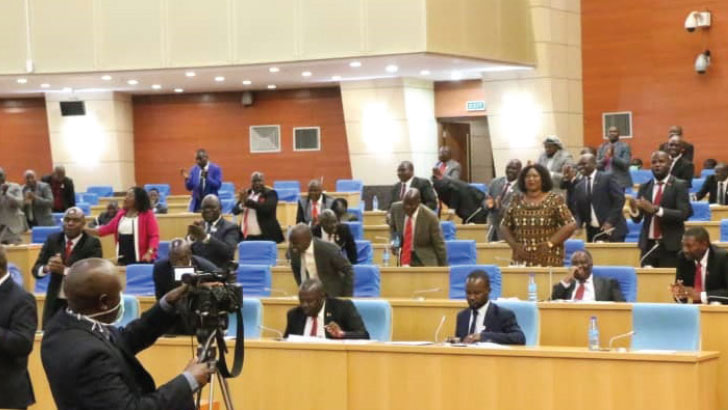Assets office dubbed ‘useless
Governance experts have described the establishment of the Office of the Director of Public Officers Declaration (Odpod) as ‘useless’ because it has failed to enforce the law and punish offenders of corruption.
Odpod was established to promote public confidence in the public service by receiving, verifying and publicising listed public officers’ declarations.

But for eight years now, the directorate has failed to gazette a summary of declarations as required under the Public Officers’ (Declarations of Business Interests) Act 2013, a development experts believe presents a fertile ground for corruption among public servants.
Since its establishment, under Section 6 (1) of the Public Officers’ Act 2013, Odpod has remained powerless in terms of enforcing the law as no offender has been punished for flouting the laid down provisions.
Political scientist and public administration expert George Phiri said in an interview on Tuesday that Odpod was one office that was established just to show-off that government is committed to fighting corruption “and not necessarily to serve the purpose of the functioning office”.

“If you look at what this office was established for and what is happening, you would say that this office is useless. We are just spending public resources on it but the public is gaining nothing.
“In my view, if the office was established for a good reason, it was supposed to have known that failure to gazette summaries of the declarations is a crime. It would also have whipped all those that have failed to declare their assets [and liabilities] over the past eight years. Failure to do so breeds and also encourages corruption,” he said.
Centre for Social Accountability and Transparency (Csat) executive director Willy Kambwandira also said failure to enforce the law provides a potential fertile ground for corruption.
“We have seen how some public officers both in the past and current governments have acquired wealth in very questionable circumstances. Our concern is that there is a casual approach to enforcement of the asset declaration law. There is more talk than tangible actions,” he said.
Kambwandira added: “Government has never demonstrated any commitment to implement this law despite scores of listed public officers not declaring their assets [and liabilities] and the office itself failing to enforce the law. Our great concern is that offices entrusted with the responsibility of enforcing the law appear to be in potential conflict of interest.
“There are deliberate efforts to frustrate implementation of the assets declaration law, and institutions are intentionally crippled through low funding.”
He further said it is important for Odpod to be open on public disclosures as doing so will help keep check on corruption and in detecting potential areas of conflict of interest in deciding processes around procurement, among others.
“We are aware that some of the information is sensitive, but Odpod must strive to proactively share this information with the general public,” Kambwandira said.
Good governance and policy analyst Mavuto Bamusi said the Odpod has betrayed public trust, adding that the office is aiding and abetting corrupt practices and rendering a blow in the belly of public sector reforms.
“It is a stamp of approval on corruption and a recipe for a deep accountability crisis. One is inclined to assume that public officers have accumulated huge wealth and unjustified assets. The failure to gazette could emanate from the fear that publishing the same would lead to massive disciplinary action, suspensions, interdictions and dismissal of senior public officials who are likely connected to the high political leadership.
“Publishing in the Gazette would mean the end of the public and collapse of the public service. It would also herald long-haul anti-corruption protests that would lead to a political crisis,” he said.
But Odpod public relations officers Tiyamike Phiri attributed the failure to gazette the names to, among others, limited human resource capacity to capture data for the purpose of gazette and other relevant reports pursuant to the statutory functions of the directorate.
Phiri also noted that the current declarations systems are manual and all the data are in hard copy format.
“Collection, filing, storage, and tracing of each officer’s declaration for compliance is also manual. These factors, among others, have made it difficult to, with minimal error, gazette the declarations without risking publishing wrong or erroneous information. Therefore, Odpod had to first establish the supporting systems for full roll out of some of its functions, including gazette,” she explained.
However, she said the directorate was now ready to gazette the declarations this month after developing its own internal automated or digital data management system in which declarations data for all the public officers who have ever declared since 2014 have been populated.
“Against this background, Odpod has now finalized generating content for gazette which will be published in April, 2022. The Gazette will start with the first category of listed public officers.”
The first category is that of political and elected leaders and, Phiri further disclosed Odpod would also be publishing its first-ever Annual Report this month courtesy of the newly-developed internal automated or digital data management system.
According to the law, failure to declare assets is a criminal offence punishable by two years imprisonment. Offenders are also liable to dismissal from public office, disqualification from holding any public office and, in case of elected officers, their seats declared vacant and banned from participation in subsequent elections.
Under the current Tonse Alliance regime, Speaker of Parliament Catherine Gotani-Hara has been under the spotlight over how her office will handle 11 parliamentarians who contravened the law by failing to declare their assets within 90 days after assuming their offices.
The 11 were discovered to have defaulted during the 2019/2020 financial year, after the Odpod referred their names to the Parliamentary Monitoring Committee (PMC) for inquiry.
The committee observed that receiving declarations alone was not enough if the Odpod was to contribute to curbing corruption and ensuring the integrity of the public service.
“It is imperative that the Odpod should intensify the verification of the assets declared by the public officers in a process akin to lifestyle audit,” reads the report in part.
The committee then, among others, directed the Odpod to gazette a summary of declarations and submit to Parliament the statutory compliance report by the end of the 2021/22 financial year.
But the Odpod public relations officers said as an institution accountable to Parliament they were aware of the committee’s guidance on the matter which it has always been providing while conducting its monitoring roles over the directorate.






One Comment